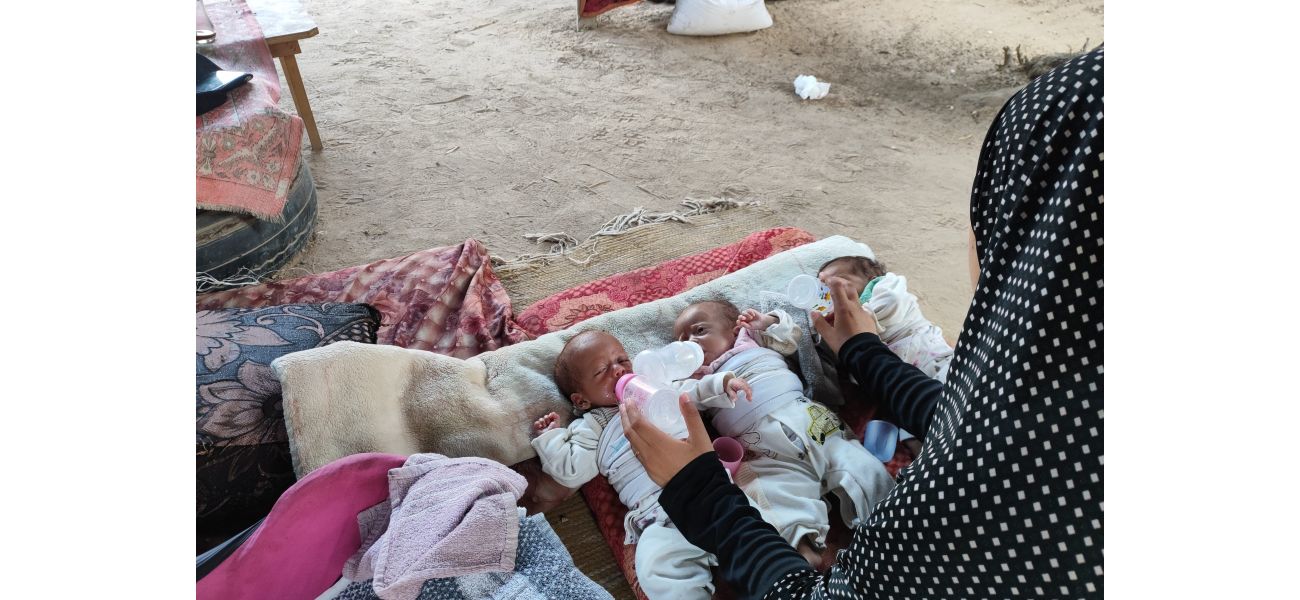Family in Gaza living in a constant state of danger and instability due to ongoing conflict.
November 16th 2024.

In the war-torn region of Gaza, pregnant, postpartum, breastfeeding, and menstruating women are facing unimaginable living conditions. One such woman, Dalia, recalls receiving evacuation leaflets in her home when she was seven months pregnant. Along with her family, she was forced to move multiple times during the conflict.
Dalia's due date came and went, but she still hadn't given birth. With the hospital three kilometers away and no transportation available, she had to walk there and back in the unbearable heat. And that was just the beginning of her struggles. After giving birth in January, she found it difficult to find clothes and enough food for her newborn. She herself became malnourished.
But perhaps the most challenging aspect for Dalia was the living conditions for her and her family. They were forced to live in a tent, which Dalia describes as a "moving tomb." The scorching heat during the day, combined with the presence of insects and lack of hygiene, made it an unbearable place for a new mother and her baby.
Dalia's baby is now at the age where she should be teething and crawling, but the tent floor is unsanitary and unsafe for her. Dalia also struggles to provide enough food for her, as her breast milk is insufficient, and there is no formula available.
Since the conflict began in October 2023, Dalia says that every essential and basic need has become non-existent. She desperately laments, "Our entire life has been destroyed, and our children's lives are shattered."
The impact of the war has been felt by everyone in Gaza, and women and children are bearing the invisible brunt of it. Amal Syam, Director of Women's Affairs Centre, explains that pregnant women are facing additional challenges due to the lack of medical care. Many are forced to give birth in unsanitary conditions, leading to an increase in premature births, miscarriages, and neonatal deaths.
Yasmeen, another new mother in Gaza, gave birth to premature triplets in April 2024 after facing multiple displacements and labor complications. With three six-month-old babies, she struggles to provide them with the basics for survival. The formula milk they need is not only expensive but also difficult to find. Yasmeen herself is looking for food to increase her breast milk supply, as she cannot afford formula. The cost of diapers is also exorbitant, with one pack being sold for 220 shekels.
The war has taken a toll on the availability and affordability of everyday essentials in Gaza. Shampoo, nappies, soap, and sanitary pads are all becoming increasingly expensive, making it challenging for women to provide for their families. And as the conflict continues, the situation only becomes more dire.
But amidst all the hardships and challenges, women like Dalia and Yasmeen continue to prioritize their children's needs above their own. They are living examples of the resilience and strength of the human spirit, even in the face of unfathomable conditions.
The living conditions in Gaza for pregnant, postpartum, breastfeeding, and menstruating women are unimaginable. Dalia, a mother-to-be, experienced this firsthand when she was seven months pregnant. As the war began, she received leaflets in her home instructing her family to evacuate. They were forced to move multiple times, which was incredibly difficult for Dalia, especially as she neared her due date.
Ten days passed after her due date and Dalia still hadn't given birth. The hospital was three kilometers away, and with no transportation available, she had to walk back and forth. It was a terrible experience for her. But that wasn't the only hardship she faced. After giving birth in January, she struggled to find clothing and food for her newborn. She even became malnourished due to the lack of resources.
To make matters worse, Dalia and her family were forced to live in a tent, which she refers to as a "moving tomb." The conditions were unbearable for a new mother and her baby. The tent was scorching hot during the day and infested with insects. Dalia explains that there was also a lack of hygiene as they had no cleaning detergents. It was a challenging and dangerous environment for her baby to live in.
With no access to basic necessities, Dalia's baby girl was unable to teethe and crawl in a safe and clean environment. Dalia also struggled to provide enough food for her newborn as her breast milk was insufficient, and there was no formula available. Since the conflict began, Dalia says that every essential and basic need has become non-existent. Their entire life has been destroyed, and their children's lives are shattered.
Unfortunately, Dalia is not alone in her struggles. As the war continues, most people in Gaza have lost their jobs, and money has become scarce. The markets are empty, and the few goods available are being sold at astronomical prices. The situation has become so dire that women are even cutting off their hair because they can no longer afford shampoo. The cost of everyday essentials has skyrocketed, making it nearly impossible for families to survive.
Amal Syam, the Director of Women's Affairs Centre, explains that women and children are the ones who suffer the most in this conflict. Pregnant women are forced to eat less to provide for their families, and new mothers are at risk due to the lack of medical care. The resources available have decreased significantly, leading to complications during childbirth and an increase in premature births, miscarriages, and neonatal deaths.
Yasmeen, another new mother in Gaza, knows these struggles all too well. She gave birth to premature triplets in April 2024 after multiple displacements and labor complications. Now, with three six-month-old babies, Yasmeen is struggling to provide them with the basics they need to survive. Formula milk is too expensive and often unavailable, and diapers are a luxury that she cannot afford. She has put her own needs aside to prioritize her premature babies' wellbeing.
The war in Gaza has taken a toll on everyone, but it is the women and children who are bearing the invisible brunt of it. The situation is dire, and the support from organizations like the DEC-member charity Christian Aid is crucial for the survival of these women and their families. As we continue to follow their stories and provide updates, we hope to raise awareness and support for those in need in Gaza. Join our Whatsapp community for the latest news and updates from Metro. Together, we can make a difference.
Dalia's due date came and went, but she still hadn't given birth. With the hospital three kilometers away and no transportation available, she had to walk there and back in the unbearable heat. And that was just the beginning of her struggles. After giving birth in January, she found it difficult to find clothes and enough food for her newborn. She herself became malnourished.
But perhaps the most challenging aspect for Dalia was the living conditions for her and her family. They were forced to live in a tent, which Dalia describes as a "moving tomb." The scorching heat during the day, combined with the presence of insects and lack of hygiene, made it an unbearable place for a new mother and her baby.
Dalia's baby is now at the age where she should be teething and crawling, but the tent floor is unsanitary and unsafe for her. Dalia also struggles to provide enough food for her, as her breast milk is insufficient, and there is no formula available.
Since the conflict began in October 2023, Dalia says that every essential and basic need has become non-existent. She desperately laments, "Our entire life has been destroyed, and our children's lives are shattered."
The impact of the war has been felt by everyone in Gaza, and women and children are bearing the invisible brunt of it. Amal Syam, Director of Women's Affairs Centre, explains that pregnant women are facing additional challenges due to the lack of medical care. Many are forced to give birth in unsanitary conditions, leading to an increase in premature births, miscarriages, and neonatal deaths.
Yasmeen, another new mother in Gaza, gave birth to premature triplets in April 2024 after facing multiple displacements and labor complications. With three six-month-old babies, she struggles to provide them with the basics for survival. The formula milk they need is not only expensive but also difficult to find. Yasmeen herself is looking for food to increase her breast milk supply, as she cannot afford formula. The cost of diapers is also exorbitant, with one pack being sold for 220 shekels.
The war has taken a toll on the availability and affordability of everyday essentials in Gaza. Shampoo, nappies, soap, and sanitary pads are all becoming increasingly expensive, making it challenging for women to provide for their families. And as the conflict continues, the situation only becomes more dire.
But amidst all the hardships and challenges, women like Dalia and Yasmeen continue to prioritize their children's needs above their own. They are living examples of the resilience and strength of the human spirit, even in the face of unfathomable conditions.
The living conditions in Gaza for pregnant, postpartum, breastfeeding, and menstruating women are unimaginable. Dalia, a mother-to-be, experienced this firsthand when she was seven months pregnant. As the war began, she received leaflets in her home instructing her family to evacuate. They were forced to move multiple times, which was incredibly difficult for Dalia, especially as she neared her due date.
Ten days passed after her due date and Dalia still hadn't given birth. The hospital was three kilometers away, and with no transportation available, she had to walk back and forth. It was a terrible experience for her. But that wasn't the only hardship she faced. After giving birth in January, she struggled to find clothing and food for her newborn. She even became malnourished due to the lack of resources.
To make matters worse, Dalia and her family were forced to live in a tent, which she refers to as a "moving tomb." The conditions were unbearable for a new mother and her baby. The tent was scorching hot during the day and infested with insects. Dalia explains that there was also a lack of hygiene as they had no cleaning detergents. It was a challenging and dangerous environment for her baby to live in.
With no access to basic necessities, Dalia's baby girl was unable to teethe and crawl in a safe and clean environment. Dalia also struggled to provide enough food for her newborn as her breast milk was insufficient, and there was no formula available. Since the conflict began, Dalia says that every essential and basic need has become non-existent. Their entire life has been destroyed, and their children's lives are shattered.
Unfortunately, Dalia is not alone in her struggles. As the war continues, most people in Gaza have lost their jobs, and money has become scarce. The markets are empty, and the few goods available are being sold at astronomical prices. The situation has become so dire that women are even cutting off their hair because they can no longer afford shampoo. The cost of everyday essentials has skyrocketed, making it nearly impossible for families to survive.
Amal Syam, the Director of Women's Affairs Centre, explains that women and children are the ones who suffer the most in this conflict. Pregnant women are forced to eat less to provide for their families, and new mothers are at risk due to the lack of medical care. The resources available have decreased significantly, leading to complications during childbirth and an increase in premature births, miscarriages, and neonatal deaths.
Yasmeen, another new mother in Gaza, knows these struggles all too well. She gave birth to premature triplets in April 2024 after multiple displacements and labor complications. Now, with three six-month-old babies, Yasmeen is struggling to provide them with the basics they need to survive. Formula milk is too expensive and often unavailable, and diapers are a luxury that she cannot afford. She has put her own needs aside to prioritize her premature babies' wellbeing.
The war in Gaza has taken a toll on everyone, but it is the women and children who are bearing the invisible brunt of it. The situation is dire, and the support from organizations like the DEC-member charity Christian Aid is crucial for the survival of these women and their families. As we continue to follow their stories and provide updates, we hope to raise awareness and support for those in need in Gaza. Join our Whatsapp community for the latest news and updates from Metro. Together, we can make a difference.
[This article has been trending online recently and has been generated with AI. Your feed is customized.]
[Generative AI is experimental.]
0
0
Submit Comment





